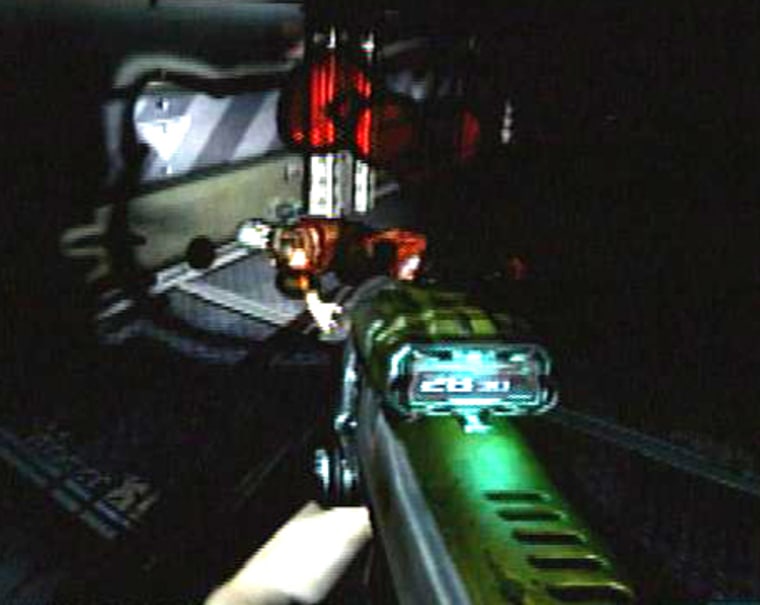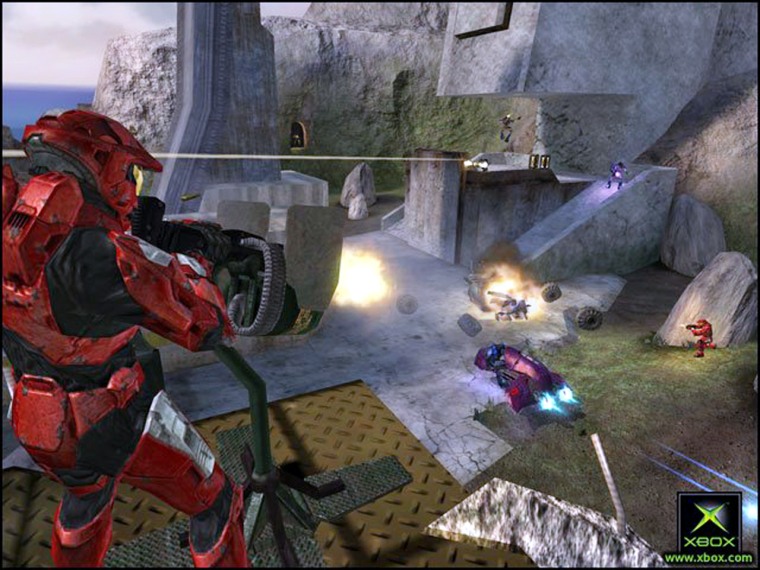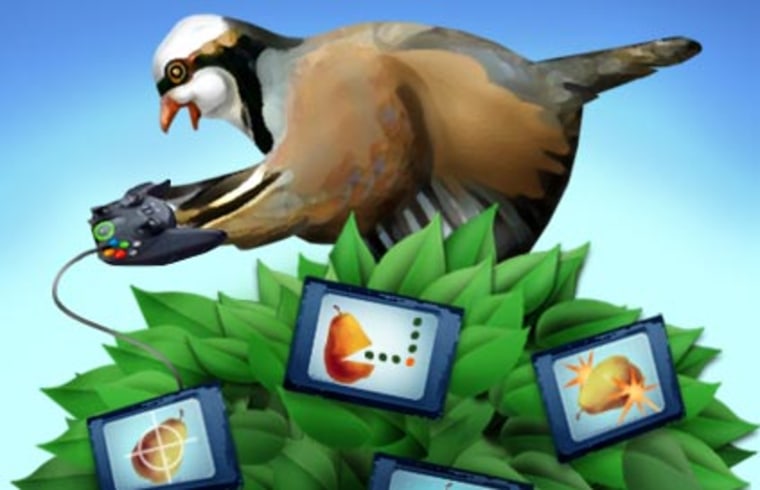2004 was the year of surprise. Games got hip to politics and politics got hip to gaming. "The Sims 2" became an interactive adventure in parenting. "Grand Theft Auto: San Andreas" taught us that it's OK to put down the controller and dance to the soundtrack. And who would have thought that "Halo 2" would be that popular?
All in all, it was a great year for joystick jockeys. So, let's take a look back at 2004 with the "Twelve Days of Christmas" as our guide.
Twelve film stars voicing ...
The most over-reported game industry story of 2004? Hollywood stars invade video gaming. I plead guilty. Among this year's celebrity appearances: Samuel L. Jackson and Chris Penn in "Grand Theft Auto: San Andreas;" Jet Li in "Rise to Honor;" Pierce Brosnan, Judi Dench, Willem Dafoe in "James Bond: Everything or Nothing;" Tobey Maguire and Kirsten Dunst in "Spider-Man 2;" Michelle Rodriguez, Mickey Rourke and Iggy Pop in "Driv3r" and Snoop Dogg in "Def Jam Fight for New York."
Eleven games politicking ...
In 2004 PC games "The Political Machine" and "Frontrunner" let players manage the political campaigns of President Bush and Sen. Kerry right down to the dirty tricks.
"John Kerry's Silver Star" from Kuma Games put gamers in Kerry's combat boots. We're still waiting for an interactive treatment of President Bush's National Guard days. Persuasive Games, an independent studio devoted to games with a message, created groundbreaking interactive stump speeches for Democrats ("Howard Dean for Iowa" and "Activism") and Republicans ("Take Back Illinois").
Smaller developers lent their skills to interactive attack ads: most noticeably the strange, but addictive "Anti-Bush Game" and "John Kerry Tax Invaders." During the election, the virtual world "There" offered updated counts. Even the Sim community caught the political fervor and released an electronic voting machine called "Dumbbold." The machine was riddled with bugs, natch.
Ten muscle building games ...
Soon gamers may be recognized for their massive pecs. Why? Because 2004 was the year that console games like "Dance Dance Revolution," "AntiGrav" and the exercise title "Yourself!Fitness" found new ways to liberate behinds from the couch. Even "Grand Theft Auto: San Andreas" got fit; making an exercise regimen as essential to character development as killing. An engineer announced a full-size game pad that builds muscles.
Medical research reports in 2004 highlighted video gaming's ability to both make better surgeons and to relax young patients before surgery. Legacy Interactive released a cardiovascular life support simulation for paramedics. Researchers attempted to cure arachnophobia with a modded "Half-Life." A leukemia patient developed a game to help younger leukemia patients deal with their treatment. And in 2004 an ordinary Nintendo Game Boy was turned into a diabetes monitoring device called "Glucoboy."
Nine "Doom 3" flashlight mods
When id Software's first-person-shooter hit the shelves in August, what was the most popular reaction on the message boards? Bewilderment... at being forced to switch between a flashlight and a weapon when traversing through the game's pitch black corridors.

The "Doom 3" community responded with a duct tape "mod" -- code modification -- allowing users to "duct tape" a flashlight to their weapons. And then things started getting a little cute. Before you could say "BFG 9000," "Doom 3" related sites were swamped with new mods that changed the look and style of the actual flashlight itself. Among the favorites: Batman's signal; a Care Bears night light; the Thundercats logo; the Playboy bunny; the "Mortal Kombat" logo; petegrams and goat heads; and, of course, Hello Kitty.
Eight game publishing water cooler topics ...
Labor woes, game publishing consolidation and an unusual apology marked some of the water cooler buzz in 2004. An anonymous letter sent to the media outlets from a spouse of an Electronic Arts employee detailed 85-hour work weeks in Santa's West Coast workshop. The International Game Developers Association published its own quality of life survey finding that 35 percent of its respondents worked 65 to 80 hours a week. And if that wasn't bad enough, the San Jose Mercury News ran a piece in March on how outsourcing is starting to hit the game industry.
Meanwhile, 2004 was a big year for Electronic Arts. They formed their own music label, started putting their titles on Xbox Live and signed a 5-year exclusive deal with the NFL effectively ending competition (and low prices) from Sega. From Britain, meanwhile, came an apology. Game designer and classy guy Peter Molyneux apologized on an online message board that his role-playing game "Fable" had not lived up to the pre-release hype.
Seven (hundred) athletes ...
Over 700 gamers from 63 countries descended on San Francisco in October for the World Cyber Games, the largest international video gaming tournament in the world. While the World Cyber Games lacked the pomp (and the volleyball cheerleaders) of that other 2004 international sporting event, it did manage to bring the world's best together with nary a drug controversy save for a couple cases of caffeine overdose.
Six illegal nation states ...
In 2004 China took the jackboot to a Swedish game, "Hearts of Iron" for "distorting history and damaging China's sovereignty and territorial integrity." The world strategy game had the audacity to get all historical and list Tibet as independent from China in the years before World War II. Manchuria, West Xinjiang and Taiwan were also portrayed as separate nations. China also banned "Soccer Manager 2005" for pretty much the same reason. Tibet, Taiwan, Hong Kong and Macau each had their own teams. What to do to stop these outside influences? How about government-approved games? In October China announced that it was reserving $250 million for native game development based on Chinese literature and myths. One game may be based on a hero from the Little Red Book days who earned fame by working himself to death (though not, presumably, at Electronic Arts). Sounds like fun!
Five million 'Halos' ...

Three weeks after its celebrity-studded Nov. 9 debut, sales of "Halo 2" passed the five million mark. The original "Halo" took more than two years to reach that milestone proving that "Halo 2" is either that much better than the original or there that are lot more lonely guys in the world today.
Four(ty)-year-old women gamers ...
Meet the new hardcore gamer. She -- yes, she -- is over the age of 40, spends 50 percent more time each week playing online games than her male counterpart, and indicates a preference for playing between the hours of midnight and 5 a.m. The data from an AOL survey conducted in January also found that word and puzzle gamers were the genres of choice among the 3,613 respondents; not exactly the sexiest genre in video gaming, but a reminder that interactive entertainment extends far beyond the latest dwarf epic.
Three games for guys ...
Video gaming's reputation in some quarters as the primary contributor to Beavis & Butthead-level social retardation received some unwanted support in 2004 with the release of "Leisure Suit Larry: Magna Cum Laude;” "Playboy: The Mansion" and "The Guy Game," the topless trivia game that took Spring Break in San Padre Island to a new low (if that can be imagined). Despite protests from various parenting groups and, in the case of "Leisure Suit Larry," a quiet yank from Wal-Mart’s shelves, the titles proved to be harmless fun -- bad double entendres excepted.
Two tiny screens ...
The handheld Nintendo DS with its coy "Touching is good" media blitz launched to oohs and ahhs in November thanks in part to its two 3-inch screens -- one a touchscreen. Since launch the dual-screen interface and touch screen control has prompted speculation from pundits on the possibilities of new types of game play. The jury is still out on that one and with the slick Sony PSP set to launch in the U.S. by March 2005, Nintendo DS owners who have bought into the "Touching is good" message will soon face a tough question: Would playing with the PSP be considered cheating?
... and a game called "Katamari Damacy"
Lost amidst the mega-hyped triple-A titles of 2004, a surprise.
"Katamari Damacy" was an addictive little title from Japan that involved little more than picking up items with a sticky ball. The game lacked the multi-million dollar budgets and Hollywood casting so beloved by the industry. But "Katamari Damacy" had the right combination of creativity and weirdness to remind this writer and tens of thousands of gamers that the best games don't require big budgets or hype.
Cheers to that. And happy New Year, everyone.
